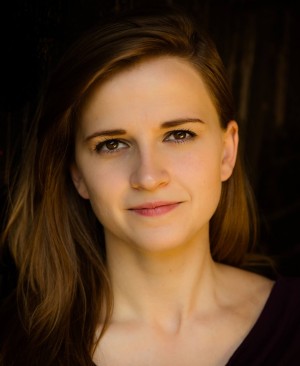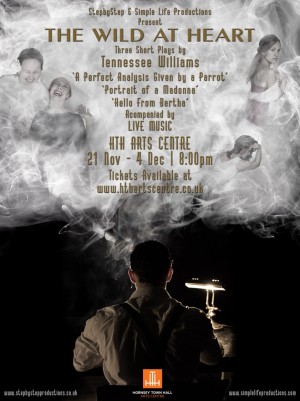 Lorna Irvine speaks with artistic director Vala Fannell.
Lorna Irvine speaks with artistic director Vala Fannell.
Vala Fannell is the Iceland-born artistic director of up-and-coming London theatre company Step By Step Productions. Their newest project The Wild At Heart takes place in Crouch End, London, at the end of November and features three classic Tennessee Williams plays, music, and cocktails. Who could resist? I caught up with her to find out a little more
Lorna Irvine: How did you form Step By Step?
Vala Fannell: It was, like so many things, very random. Through a chat with an actor friend at a pub we decided to stage a small play together. In that process he called me one day and asked what my company was called. I hadn't realised I needed a company and never thought that was something I was interested in but for some reason I had the name in my head all ready and told him Step By Step. Then another friend asked me to produce his show and then came the next and I realised this is actually absolutely great. It is by now rapidly growing, offering me the opportunity to create and direct theatre and I look forward to seeing where it can take me.
LI: Tell us a little bit about the new production, please?

VF: The production is a collection of three short plays by Tennessee Williams. They will be accompanied by a live band playing jazz and blues throughout the evening, as well as a bar serving themed cocktails and snacks. It will be a cabaret style performance, giving the audience an authentic 1940's experience in the world of Mr. Williams. The three plays are usually performed separately but all have in common telling the story of women dancing on the edge of self-destruction for various reasons. It is put together by a large group of young theatre professionals, combining their ambitions to create an epic evening of art, culture and entertainment.
LI: Why do you think Tennessee Williams' work has so endured?
VF: I think Tennessee Williams is the master of writing about characters' struggle with their own desires and passions, their battle with conformity. I think very few writers and artists have had the courage to display this human imperfection with such clarity but most people, if not all, understand it and can relate to it on some level. I think his fearless approach regarding the human vulnerability in the face of what is socially acceptable is something that people will always be able to relate to, whichever culture, class, religion or race they might belong to.
LI: Why are women so marginalised in the theatre, in terms of the technical side, and roles on stage?
VF: To be honest I think society has just not evolved further. The structure was x-y-z back in the day and we're still coming out of it. Change can be difficult, I think, because we as human beings like to feel secure, feel like we understand the world we live in and when someone suggests big changes, we as a species go towards them like a frightened child, testing if this can be trusted. So it can take a long time for everyone to adjust.
In terms of roles for women? This is a very interesting one. When we decided to go for three female-led plays, we discussed if this was a bit of financial suicide. Would we be cutting our target group by half or more and can we, at the start of our careers, afford taking this risk? That then spurred us to think why on earth we were even questioning the choice on this basis.

By questioning it, we were only enforcing a traditional approach we don't even agree with. We are raised with male heroes in the forefront, where women are not an interesting subject as such. This then just becomes the truth. How society thinks about women is still a bit funny. Doing a film or a show based on women is a bit risky because it is not what sells. Unless, of course, you throw in a bit of sex. So of course there is much less interesting work written about female characters. I think this is changing though. Approaching this gap as a battle is counterproductive. There is no use pointing fingers. We are working to change a long history of social tradition, consensus and structure. We need to steadily take solid steps in the right direction, knowing we will get there in the end. But we need to make sure we don't just talk about it but have the guts to do it too.
LI: What's next for you?
VF: Christmas filled with sleep, food and festivities! Following that, I'll be directing a musical in Iceland in early 2016 of which I am very excited. Then I'll be returning to London where my company, Step By Step, has three potential productions lined up for the spring and summer. What's beyond that I am looking forward to finding out!